5 Findings from the Social Media Examiner 2014 report
Are you interested to find out where other marketers are focusing their efforts on social media to grow their business? Which techniques are proving effective and why? This regular, annual report from the Social Media Examiner is a useful summary of what is effective from over 2,500 marketers, so in this summary I cover 5 main findings from the report, which can be downloaded from the Social Media Examiner's website.
1. Benefits of Social Media?
In terms of business benefits, the top two benefits are increasing exposure (brand awareness) and driving additional traffic.
'92% of marketers have increased their exposure through social media and 80% had positive results in terms traffic'.
The graph below shows the range of benefits:
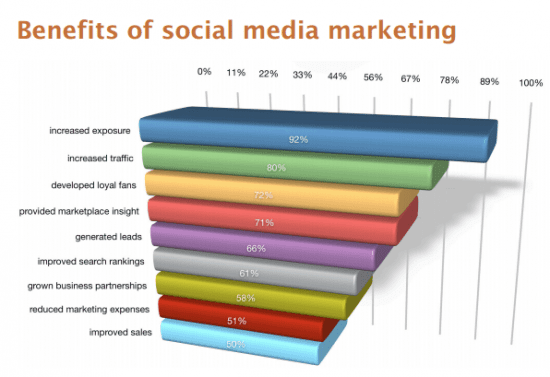
Respondents share their benefits from social media:
- Improved sales: Over half of the respondents have seen an increase in sales after using social media for at least 3 years, and on the flip side the remainder have not realised growth. Though the report highlights, that this could be due to a lack of measurement and associated tools, for companies to be able to understand the true impact of social media on their business.
- Increased exposure: Over 95% gained business exposure even with as little as 6 hours a week allocated within a year, to social media.
- Growing Partnerships: Partnerships evolved from spending time engaging in social media, for companies who were active for at least a year. 6!% of respondents selling to businesses were more likely to acquire partnerships, compared to 54% selling to consumers.
- Lead Generation: The more time spent on social media has resulted in lead generation from those being active for more than a year spending in some cases 6 hours a week.
- Reduced marketing expenses: 57% of companies with less than 10 employees realised efficiencies in expenditure, whereas 60% of companies with more than 1000 employees disagreed.
- Improved search rankings: Companies active for more than a year improved their SEO according to 58% of respondents.
- Increased traffic: Companies who had been using social media for longer with more experience, were gaining increased traffic from their strategies.
- Insight into the marketplace: Companies were acquiring useful information which could be due to the range of tools and metrics now easily accessible, about their own activities, competitors and the marketplace in general.
- Increased Fan loyalty: Loyalty was more apparent with B2B companies compared to those in B2C, and time invested in social media impacted this. Those spending 6 hours per week saw an increase in fan loyalty compared to those investing 5 hours or less a week.
2. The most commonly used social media platforms?
The chart below shows the most commonly used social media platforms, with the top 5 ranking as Facebook, Twitter, LinkedIn, YouTube and Blogging. Their annual survey has seen little change in the top 7, and this year new platforms have emerged including social media review sites including Yelp, short video from Vine and Snapchat and deal/voucher sites such as Groupon and Q&A Sites (Quora)
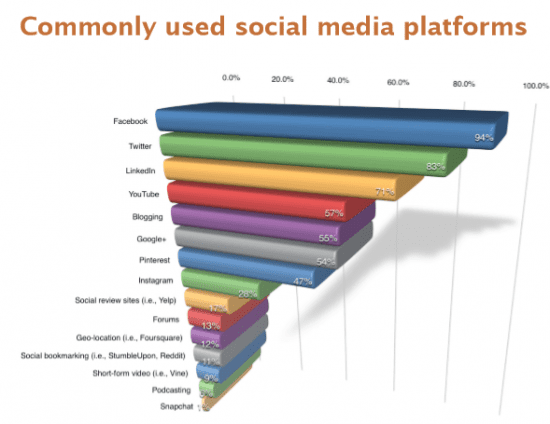
Increased usage across platforms has been highlighted, except for a small decline in Blogging.
Interesting that those companies who are new to social media have started off using Facebook, Twitter and LinkedIn. Where those more established after a year of use, have extended their strategies to YouTube, and Marketers with 2-4 years experience have branched into using Google+ even though some companies are still unsure how to use this platform.
The more established have focussed primarily on content creation, with 76% pushing content via YouTube, 71% via Blogging and 15% podcasting.
The survey highlights the differences in use of B2B companies vs B2Cs; B2C are more focused on Facebook, YouTube, Pinterest and Instagram whereas B2B are focused on LinkedIn, Google+ and Blogging.
In terms of the most important social media channel, Facebook (68% of respondents) is the most important for B2C companies where those in B2B indicated LinkedIn.
3. How Marketers will change their social media activities
For companies planning on increasing their budget in social media, the drive will be towards Blogging, YouTube, Twitter, LinkedIn and Facebook.
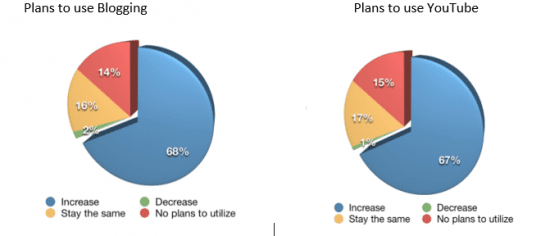
Only 15% were likely to use Snapchat, though we know this is very specific to particular types of audiences and industries.
As previously mentioned, Blogging is becoming more popular and has jumped from number four most important in 2013 to the top spot for increased activity, with 74% of B2B marketers seeking to increase their efforts in Blogging.
Taking the findings one by one:
- 67% plan to increase YouTube activity.
- 67% plan to increase Twitter and this has increased by 67%.
- B2B Marketers are more likely to increase activity on LinkedIn; 77% B2B and 54% of those working in B2C.
- Facebook is showing declining usage, and 7% of respondents are likely to decrease activity on this channel but for some it’s still the most important channel as detailed in the report. (only 4% do not plan to use it) and it’s more popular with B2C marketers.
- Google+ is on the radar for Marketers and 6!% plan on increasing activity.
- Half of respondents will increase their presence on Pinterest and it’s more popular with female marketers in terms of usage than males.
- Instagram is on the increase, amongst 42% of the companies and more than a third will increase their use of short from video ie vine.
- Even though Forums have declined since 2013, some companies are realising benefits with this channel.
- More than a three fold increase in the use of podcasting which could be a result of smartphones and mobile devices.
- Small numbers are looking to use social review sites and bookmarking and gelocation ie Foursquare.
4. Which social media platforms do marketers want to learn more about?
Respondents were asked which social media platforms they were looking to learn more about, and the common channel was Google+, where in the 2013 report this was Blogging.
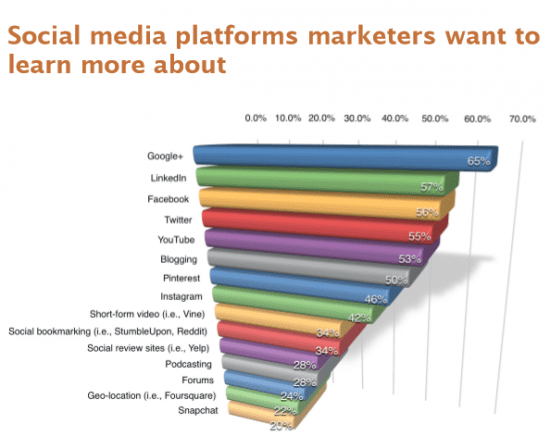
B2C are looking for more information about Facebook (60%) and B2B about LinkedIn (65%).
Newcomers are looking for information on Google+, LinkedIn and then Facebook where more experienced Marketers, will focus on Google+. YouTube and LinkedIn.
5. Which paid social media is most popular?
There is a very clear finding here. The most popular form of paid social media advertising amongst respondents is comfortably Facebook followed by LinkedIn and Twitter adverts:
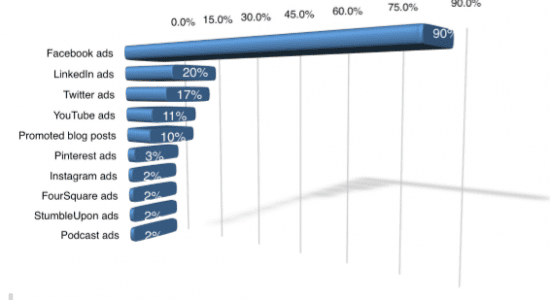
So, those are the 5 key areas of the report for me. I hope the summary is useful to compare your approach.











